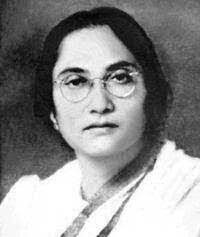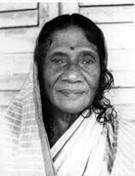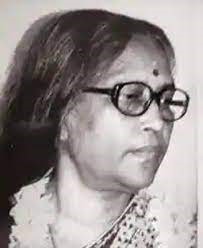PREVIOUS
Women Leaders in Constituent Assembly of India – PART III
June 1 , 2023
595 days
3142
0
(இதன் தமிழ் வடிவத்திற்கு இங்கே சொடுக்கவும்)
7. Leela Roy
- Leela Roy née Nag was a radical leftist Indian woman politician and reformer, and a close associate of Netaji Subhash Chandra Bose.
- Leela Roy was born on 2nd October of 1900.
- She was born in Goalpara, Assam to Girish Chandra Naag, who was a deputy magistrate, and her mother was Kunjalata Naag.
- She was born into an upper middle class Kayastha family in Sylhet in Bengal (now in Bangladesh).
- She was the first female student at Dhaka University.
- She educated at the Bethune College in Calcutta in 1917.
- Her father was Girischandra Nag. He was the tutor of Subhas Chandra Bose.
- She threw herself into social work and education for girls, starting the second girls’ school in Dhaka.
- Over the years, she set up a few schools and institutes for women.
- She contacted Netaji Subhas Chandra Bose when he was leading the relief action after the 1921 Bengal floods.
- Leela Nag, then a student at the Dhaka University, was instrumental in forming the Dhaka Women's Committee and, in that capacity.
- In that way she collected more donations and relief materials with the slogan "Help Netaji".
- In 1931, she began publishing Jayashree the first magazine edited, managed, and wholly contributed by women writers.
- It received the blessings of many eminent personalities including Rabindranath Tagore, who suggested its name.
- Leela Nag formed a rebellion organization in December 1923 called Deepali Sangha (Dipali Sangha) in Dhaka where combat training was given.
- Pritilata Waddedar took courses from there.
- She took part in the Civil Disobedience Movement and was imprisoned for six years.
- In 1938, she was nominated by Congress President, Subhas Chandra Bose to the National Planning Committee of the Congress.
- In 1939, she married Anil Chandra Roy.
- On Bose's resignation from the Congress, the couple joined him in the Forward Bloc.
- In 1941, when there was a serious outburst of communal rioting in Dhaka, she along with Sarat Chandra Bose formed the Unity Board and National Service Brigade.
- In 1942, during the Quit India Movement both she and her husband were arrested, and her magazine was forced to cease.
- On her release in 1946, she was elected to the Constituent Assembly of India.
- During the partition violence, she met Gandhi in Noakhali.
- After the Partition of India, she ran homes in Calcutta for destitute and abandoned women and tried to help refugees from East Bengal.
- From 1946 to 1947, Roy set up seventeen relief camps in Noakhali.
- In 1947 she founded the Jatiya Mahila Sanghati, a women's organisation in West Bengal.
- In 1960 she became the chairwoman of the new party formed with the merger of the Forward Bloc (Subhasist) and the Praja Socialist Party but was disappointed with its working.
- After two years she retired from active politics.
- She died in June 1970, after a prolonged illness.
- On 22 December 2008, Leela Roy's portrait was unveiled in the Central Hall of the Parliament of India.

8. Malati Devi Choudhury
- Malati Devi Choudhury was an Indian civil rights and freedom activist and Gandhian.
- Malati Devi Choudhury was born on 26th July 1904 in East Bengal.
- Her father, Kumud Nath Sen, who was a barrister, died when she was only two and a half years old.
- Malati was raised by her mother, Snehlata Sen, who was a writer and a translator.
- Her family was rich with politicians.
- Her grandfather Beharilal Gupta was an ICS officer.
- Her cousins Indrajit Gupta and Ranjit Gupta went on to become the Home Minister and the Chief Secretary of West Bengal respectively.
- Her brothers PK Sen and KP Sen were Income Tax Commissioner and Indian Postal Service Officer respectively.
- However, Malati did not choose the path of formal politics.
- Instead, she decided to work for and with the people.
- At the age of 16, she was admitted to Viswa Bharati, Santiniketan.
- Here she was influenced directly by the teachings and principles of Rabindranath Tagore.
- She was inspired by Mahatma Gandhi and Rabindranath Tagore in her school days.
- She married Nabakrushna Choudhury who was also from a family of freedom fighters.
- She dedicated her entire life to the cause of freedom struggle and service of the people.
- In 1942, she carried Gandhi’s message ‘Do or die’ to the people of Odisha and participated in the Quit India Movement for which she was arrested and sentenced to three years imprisonment.
- After her release, she started the construction of ‘Baji Rout Hostel’ in Angul where she rehabilitated the tribal and orphan children and taught them.
- On 9th December 1946, she was selected as a member of the Constituent Assembly of India, and she became the President of the Orissa Pradesh Congress Committee.
- She was one of the women who helped draft the Indian Constitution.
- In 1946 she joined Mahatma Gandhi’s peace mission in Nuakhali and spent there for some time.
- However, she quit the assembly soon after to work with Gandhi in Noakhali.
- She wanted to focus on her work with farmers, dalits, tribals, and children.
- In 1948, she formed ‘Utkal Nabajiban Mandal’ for the education of the children of poor and tribal.
- She has won many awards in her life for her contribution to society.
- These included National Award for Child Welfare (1987), Jamnalal Bajaj Award (1988), Utkal Seva Sammaan (1994), Tagore Literacy Award (1995).
- When Emergency was proclaimed in 1975 Malati protested the dictatorial policies of Indira Gandhi and her government. This resulted in her imprisonment.
- In 1988, she refused to receive the prestigious Jamnalal Bajaj Award from the hands of the Prime Minister Rajiv Gandhi, because, according to her, Rajiv Gandhi had not done anything to promote Gandhian values.
- She died on 15 March 1998.

9. Purnima Banerjee
- Purnima Banerjee was an Indian anti-colonial nationalist and a member of the Constituent Assembly of India from 1946 to 1950.
- Purnima Banerji was born into a Bengali Brahmo family in 1911.
- Her father, a restaurant owner, hailed from the Barisal district of Eastern Bengal (now Bangladesh) who later settled in the United Province.
- Purnima Banerjee’s mother name is Ambalika Devi.
- They were a group of five siblings, three brothers and two sisters.
- She was younger to Aruna Asaf Ali (a renowned freedom fighter), Uditendu and older to Amarendu and Prabhatendu Ganguly.
- The name Purnima was given by Rabindranath Tagore.
- Later she became the daughter-in-law of Mr. Pyarelal Banerji, Solicitor General of Allahabad.
- Purnima Banerji became a part of the Indian National Congress since its inception in 1934.
- She was also the secretary for the Indian National Congress city committee in Allahabad.
- As a secretary, she effectively engaged the rural communities, organized trade unions and kisan meetings efficiently.
- She took part in the 24 days Dandi March in 1930.
- In 1941, she, along with Sucheta Kriplani started individual satyagraha for which both were eventually arrested.
- Banerji was again arrested in 1942 for taking part in the Quit India movement.
- She had to take her B.A. exams from prison.
- Then she became a member of the Uttar Pradesh Legislative Assembly and of the Constituent Assembly of India.
- She was the first woman to lead the chorus of Jana Gana Mana after it was officially adopted as our National Anthem on 24th Jan 1950.
- Owing to her ill health, she died prematurely in 1951 in Nainital.

-------------------------------------
Leave a Reply
Your Comment is awaiting moderation.


